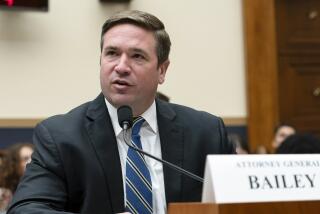Homeowners Receive Nothing in Class Action Against Lender
- Share via
WASHINGTON — An estimated 80,000 homeowners nationwide who were supposed to share in a landmark $5-million to $20-million class-action settlement against a major mortgage lender will get nothing.
The defendant in the widely publicized case over alleged illegal loan fees, Ford Consumer Finance Co., will escape all payments to borrowers, despite having agreed to settle with them for millions in mid-1996.
The story of how the settlement unraveled--and why the case arose in the first place--is a cautionary tale for homeowners, lenders and lawyers alike. Here’s what happened:
The suit began in late 1994, when a group of customers of Ford Consumer Finance--a subsidiary of the giant auto maker--alleged that the company had bribed loan brokers to steer applicants into mortgages with excessive rates and fees.
The plaintiffs charged that Ford “secretly paid [mortgage] brokers to induce their customers to sign for loans at rates and fees inflated above the retail rates actually approved” by Ford in its pricing sheets.
The alleged fees ranged from $400 on a $27,000 home loan to $5,441 on a $121,200 mortgage.
Ford, which now goes by the name Associates Home Equity Services Inc., vigorously denied all the allegations. By the spring of 1995, however, lawyers for the homeowners and Ford were deep into settlement negotiations.
The principal attorney for the borrowers, Edward K. O’Brien of Nashua, N.H., predicted a sizable payout.
When the final settlement was unveiled on July 31, 1996, it delivered what sounded like big numbers--anywhere from $5 million to $20 million, depending on how many of the estimated 80,000 affected borrowers qualified.
*
U.S. District Judge George A. O’Toole of Boston preliminarily approved the settlement and “provisionally” certified the large class of Ford borrowers covered by the deal, pending only a routine hearing on the fairness of the settlement.
As consumer advocates studied the fine print of the settlement, some concluded that it wasn’t so fair to Ford borrowers at all.
For starters, only certain homeowners would be eligible for substantial reimbursements--those who could document that they paid six “points” (6% of the loan amount) to brokers without disclosure of those fees by the broker. Borrowers who paid lower points would receive lower amounts.
Everyone else would get $50 or a $250 credit toward closing costs on a refinancing with Ford.
In exchange for this underwhelming individual compensation, borrowers would have to agree not to sue Ford in the future.
Most grating of all to critics was what O’Brien and co-counsel Daniel Edelman of Chicago negotiated for themselves: A $1-million legal fee.
The most outspoken critic, Bruce Marks, president of the Neighborhood Assistance Corp. of America, a Boston-based activist group, called the legal fee “outrageous.” Marks also threatened to mobilize Ford borrowers to oppose the settlement at the fairness hearing in September 1997.
In the meantime, the U.S. Supreme Court handed down a decision that ultimately torpedoed the settlement.
In a case with no connection to Ford or mortgages, the court issued a new standard for lower courts confronting proposed settlements in class-action suits.
In effect, said the ruling, if individual plaintiffs do not constitute a true “class” with all members sharing common fact patterns, courts should not approve any negotiated settlement of their class-action suit. If the class itself can’t be “certified,” the class settlement shouldn’t go forward.
Lawyers working for Marks cited the new standard in a brief filed with O’Toole at the September fairness hearing.
O’Toole took a hard look at the Ford plaintiffs’ complaints and concluded that individual borrowers had faced a variety of situations in their dealings with loan brokers. Therefore they didn’t meet the key tests necessary to certify them as a class.
Applying the Supreme Court’s new rule, this meant that their negotiated settlement with Ford would have to be rejected as well.
O’Toole threw out the entire class-action settlement earlier this year. Marks, for his part, claims victory, even though large numbers of borrowers who were in line for at least modest financial settlements now will get zero. He says they should sue Associates Home Equity in state courts individually or in new class actions.
O’Brien, who won’t get his share of $1 million for three years of legal work, bitterly blames Marks for delaying and defeating the settlement. Ford, which now doesn’t owe customers a cent, still faces other headaches: At least three federal agencies are investigating Associates Home Equity for possible violations of fair lending and anti-kickback statutes.
More to Read
Inside the business of entertainment
The Wide Shot brings you news, analysis and insights on everything from streaming wars to production — and what it all means for the future.
You may occasionally receive promotional content from the Los Angeles Times.










